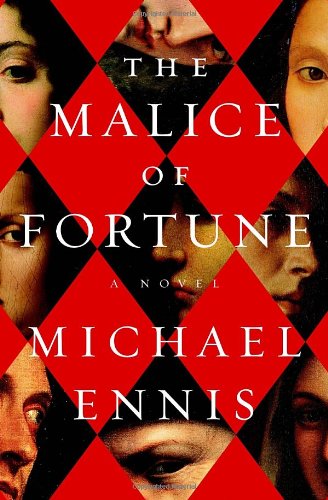People recommend books to me a lot. It's hard to
know when or how to fit them all in! And then there's the worry I won't
like a book that is very dear to a dear friend's heart. So for a long
time, I just avoided reading books that had been recommended to me,
unless someone pushed a physical copy into my hot little hands. (This is still the fastest way to get a book to the top of my list.) So I started a
new list from which to pick, of books friends recommended. If you want
to get in on this, you can recommend a book on this post.
When I started reading this, my first reaction was that this seemed to be a more literate Da Vinci Code. In a historical setting rather than the present, and with da Vinci as an actual character rather than the architect of the puzzle. Still, people being killed in a theatrical manner and left in patterns for the pursuers to solve? It does sound a bit familiar, does it not?
Luckily, it is more literate and somewhat deeper, overcoming most of my early worries. I can't say that this is one I'm running out to recommend to people, but I am glad someone recommended it to me. I doubt I would have run across it otherwise, and it was an interesting read.
Ennis has obviously done a lot of thinking about the Borgias. I mean, a lot. Also about modern theories of sociopaths, and not a little about serial killers. All of these get pulled together to create the setting of Malice of Fortune, where Damiata, a courtesan who was a lover of the elder Borgia's younger son, and mother of his son, is sent to find out who killed her former lover. Otherwise, she herself will be presumed guilty. Her son is held hostage to enforce compliance.
This book presumes all the most lurid stories about the Borgias barely do them justice. I know nothing of the scholarly debate on the issue, as this is definitely not my period or continent of specialty. I do think there's a debate, though, on how many of those stories are true, and how many are gossip and invention designed to discredit them. But for the purposes of this book, every orgy, every murder, every blasphemy that can be committed in the Vatican probably is.
The first third of the book is told through letters from Damiata to her son. The rest comes from the man she meets while searching for the truth. You may have heard of him. No, not da Vinci. Well, also him. But mostly Machiavelli. I am puzzling over what this change in narrators adds. It adds something to the comfort of Machiavelli and the reader, I guess, knowing Damiata's true feelings and motivations. It makes her a more understandable character. However, the book might have been more tense by making her a bit more opaque. Be that as it may.
While searching, Damiata and Machiavelli keep coming across bits of women, scattered in patterns that make particular sense to da Vinci. I am not the fondest of serial killer books, so I will pass over this lightly. It wasn't done with extreme detail, but still, more dismembered women? Not my favourite topic.
Remember how, last week, I was saying there was a post about colonialism and contact and science fiction percolating but not quite ready to come out? There's another one here, about using courtesans and well-off prostitutes as main female characters in historical fiction/fantasy. Similarly, that idea is composting. At some point (as in, after I get this last chapter of my dissertation finished), I will hopefully have some time to sit down and think about them and write down my ideas.
Malice of Fortune is pretty good, despite my serial killer reservations. I couldn't speak to the history, but the story moves along, and the denouement is satisfying. Thanks, Cinz, for recommending this one!

No comments:
Post a Comment